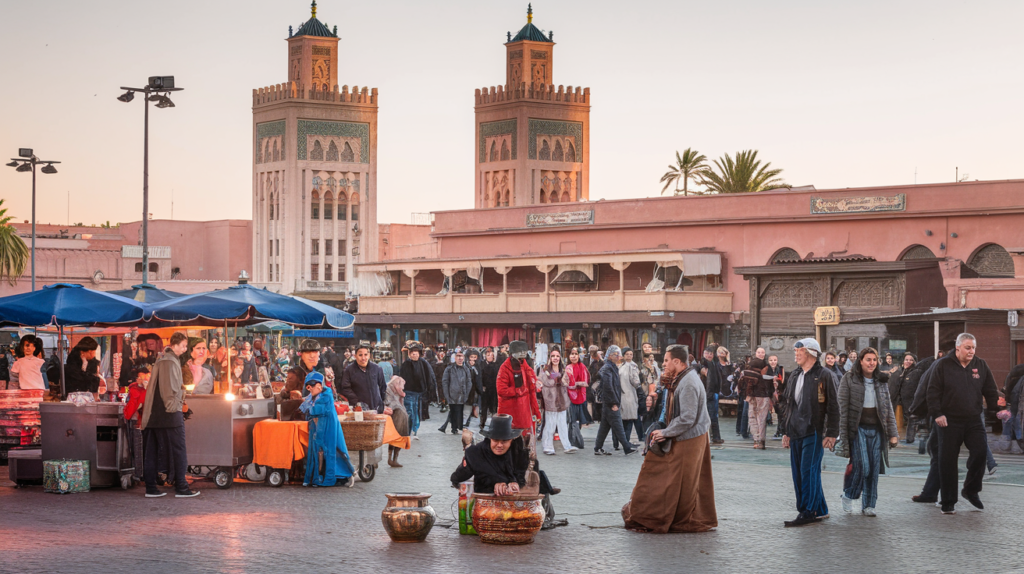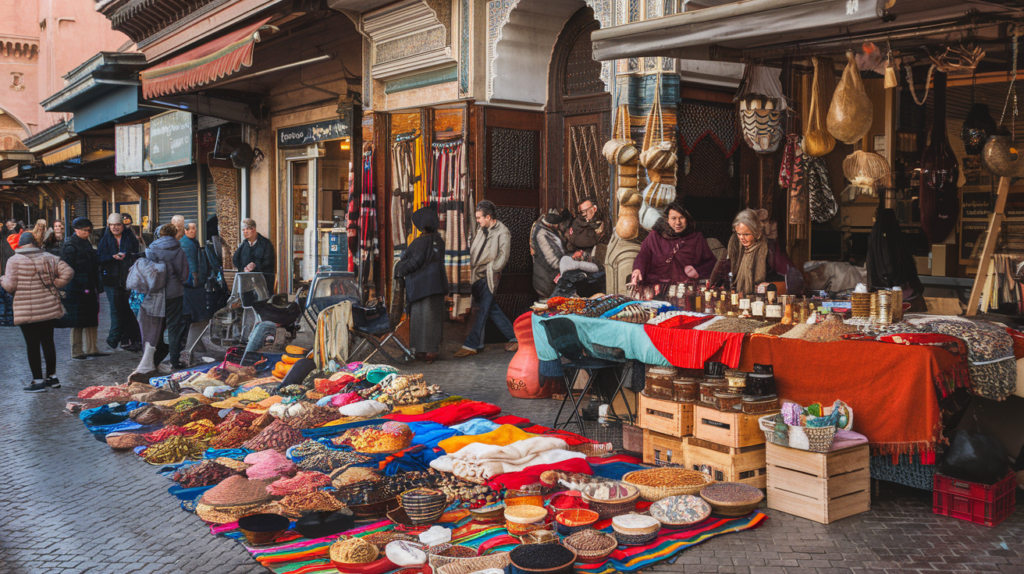Morocco Travel: A Comprehensive Guide to Exploring Morocco
Morocco is an alluring blend of ancient traditions, stunning landscapes, and vibrant cultures that make it a dream destination for travelers. Nestled in North Africa, this enchanting country offers a unique combination of bustling cities, vast deserts, mountain ranges, and a coastline that stretches along both the Atlantic Ocean and the Mediterranean Sea.
Whether you’re wandering through the narrow streets of Marrakech, getting lost in the blue alleys of Chefchaouen, or camping under the stars in the Sahara Desert, Morocco promises a magical experience. In this guide, we will explore all the reasons why Morocco travel should be on your bucket list.
Table of Contents
Why Morocco is a Top Travel Destination
Morocco has gained immense popularity as a top travel destination, and it’s easy to see why. Its rich history, vibrant markets, stunning architecture, and delicious cuisine draw visitors from around the globe. Whether you’re an adventurer, a culture seeker, or someone looking for a peaceful retreat, Morocco has something to offer.
The Unique Charm of Moroccan Culture
One of the most captivating aspects of Morocco is its deep-rooted culture. Influenced by Berber, Arab, and French traditions, the country presents an incredibly diverse cultural landscape. From traditional music and art to intricate designs found in mosques and palaces, the cultural immersion is like no other.
Best Time to Visit Morocco
When planning your Morocco travel adventure, timing is crucial. The country’s diverse geography means that different regions have varying climates throughout the year.
Seasonal Overview
Generally, the best time to visit Morocco is during the spring (March to May) and fall (September to November). During these months, the weather is pleasant, and you can comfortably explore cities and outdoor attractions.
Weather and Climate Conditions
Morocco’s coastal areas tend to have milder temperatures, while the interior regions, particularly the Sahara Desert, experience extreme heat in the summer and cold nights in the winter. If you’re interested in hiking or desert camping, plan accordingly.
Festivals and Events
If you want to add some cultural festivities to your itinerary, consider timing your trip with festivals such as the Fez Festival of World Sacred Music or the Marrakech International Film Festival.

Top Destinations in Morocco
When traveling to Morocco, certain cities and landmarks are must-visits. Here’s a breakdown of the top destinations you shouldn’t miss:
Marrakech: The Red City
Marrakech is one of Morocco Travel most famous cities and is known for its bustling souks, beautiful gardens, and historical sites. Be sure to visit the Jemaa el-Fnaa square, where street performers, food vendors, and musicians create a lively atmosphere.
Fes: The Cultural Hub
Fes is home to the oldest university in the world, the University of Al Quaraouiyine. The city’s medina is a UNESCO World Heritage site, filled with narrow alleyways, traditional Moroccan architecture, and countless markets selling everything from spices to handmade crafts.
Chefchaouen: The Blue Pearl
Chefchaouen, located in the Rif Mountains, is famous for its stunning blue-painted streets and buildings. This picturesque town is perfect for a peaceful escape, with hiking opportunities and local markets to explore.
The Sahara Desert Experience
No Morocco travel experience is complete without a journey into the Sahara Desert. Camel treks, sandboarding, and sleeping under a star-lit sky in a traditional Berber camp offer an unforgettable adventure.
Moroccan Cuisine: A Feast for the Senses
Food lovers will be in heaven in Morocco. The country’s cuisine is a tantalizing mix of spices, flavors, and textures, influenced by Berber, Moorish, and Arab traditions.
Popular Moroccan Dishes to Try
Some must-try dishes include tagine (a slow-cooked stew made in a clay pot), couscous, pastilla (a savory-sweet pie), and harira (a traditional soup often served during Ramadan). Don’t forget to sip on refreshing mint tea, a Moroccan staple.
Food Tours and Cooking Classes
For an immersive culinary experience, consider joining a food tour or taking a cooking class. Many local guides offer the chance to visit markets, select fresh ingredients, and learn how to cook traditional Moroccan dishes.
Experiencing Morocco’s Rich History
Morocco Travel is steeped in history, with ancient cities and monuments that date back thousands of years.
Ancient Medina of Fes
The medina of Fes is one of the oldest and most well-preserved in the world. It’s easy to get lost in the maze of alleys, but that’s part of the charm. You’ll find traditional tanneries, madrasas (Islamic schools), and mosques, each with its own unique story.
The Historic Ruins of Volubilis
For history buffs, a visit to the Roman ruins of Volubilis is a must. This ancient city, once part of the Roman Empire, features stunning mosaics, columns, and other remnants that transport visitors back in time.
Adventure Travel in Morocco
If you’re looking for adventure, Morocco Travel won’t disappoint.
Hiking in the Atlas Mountains
The Atlas Mountains are a hiker’s paradise, offering treks through stunning landscapes, including snow-capped peaks, valleys, and traditional Berber villages.
Surfing in Essaouira
For water sports enthusiasts, Essaouira, located along the Atlantic coast, is a popular spot for surfing and windsurfing. The laid-back vibe and fresh seafood make it a perfect coastal escape.
Cultural Etiquette and Customs in Morocco
Morocco Travel is a predominantly Muslim country, and it’s important to respect local customs and traditions during your visit.
Dress Code and Respecting Local Traditions
While Morocco Travel is fairly liberal, modest clothing is appreciated, especially in more conservative areas. Women should consider covering their shoulders and knees, and men should avoid shorts in certain regions.
Interaction with Locals: Do’s and Don’ts
Moroccans are known for their hospitality, but it’s important to approach interactions with respect. Avoid discussing sensitive topics like politics or religion, and always ask for permission before taking photos of people, especially women.

Practical Travel Tips for Visiting Morocco
Before you embark on your Morocco travel adventure, here are a few practical tips:
Visas and Entry Requirements
Most tourists can enter Morocco without a visa for up to 90 days. However, it’s always best to check with your local Moroccan embassy for the latest requirements.
Transportation: How to Get Around
Morocco has a well-developed transportation system, including trains, buses, and taxis. Trains are an affordable and efficient way to travel between major cities like Marrakech and Fes.
Currency and Budgeting
The local currency is the Moroccan dirham (MAD). Morocco is relatively affordable for travelers, with budget options for accommodation, food, and transportation.
Conclusion
From the bustling souks of Marrakech to the tranquil deserts of the Sahara, Morocco travel offers something for everyone. Its rich culture, delicious cuisine, and breathtaking landscapes make it an unforgettable destination for any traveler. Whether you’re seeking adventure, relaxation, or cultural immersion, Morocco should undoubtedly be on your travel bucket list.
FAQs
- Is Morocco safe for tourists?
Yes, Morocco is generally safe for tourists, but it’s always recommended to stay aware of your surroundings, especially in crowded areas. - What is the best way to travel between cities in Morocco?
Trains are the most efficient and affordable way to travel between major cities, while buses and taxis are great options for more remote locations. - Can I visit the Sahara Desert in one day?
Visiting the Sahara Desert typically requires at least a two-day trip, with one night spent camping in the desert.
There are no reviews yet. Be the first one to write one.







